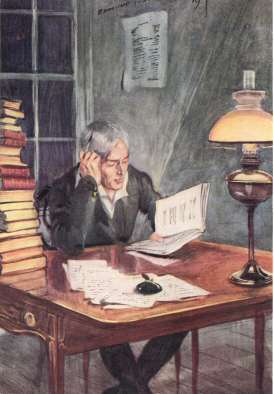Transcribed from the 1914 T. N. Foulis edition ,
LAVENGRO
THE SCHOLAR, THE
GYPSY, THE PRIEST
BY GEORGE BORROW
with twelveillustrations in colour
BY EDMUND J. SULLIVAN
T. N. FOULIS, PUBLISHER
london, edinburgh& boston
Printed by Ballantyne, Hanson &Co.
at the Ballantyne Press, Edinburgh
p.vPREFACE
In the following pages I have endeavoured to describe a dream,partly of study, partly of adventure, in which will be foundcopious notices of books, and many descriptions of life andmanners, some in a very unusual form.
The scenes of action lie in the British Islands;—pray benot displeased, gentle reader, if perchance thou hast imaginedthat I was about to conduct thee to distant lands, and didstpromise thyself much instruction and entertainment from what Imight tell thee of them. I do assure thee that thou hast noreason to be displeased, inasmuch as there are no countries inthe world less known by the British than these selfsame BritishIslands, or where more strange things are every day occurring,whether in road or street, house or dingle.
The time embraces nearly the first quarter of the presentcentury: this information again may, perhaps, be anything butagreeable to thee; it is a long time to revert to, but fret notthyself, many matters which at present much occupy the publicmind originated in some degree towards the latter end of thatperiod, and some of them will be treated of.
The principal actors in this dream, or drama, are, as you willhave gathered from the title-page, a Scholar, a Gypsy, and aPriest. Should you imagine that these three form one,permit me to assure you that you are very much mistaken. Should there be something of the Gypsy manifest in the Scholar,there is certainly nothing of the Priest. With respect tothe Gypsy—decidedly the most entertaining character of thethree—there is certainly nothing of the Scholar or thePriest in him; and as for the Priest, though there may besomething in him both of scholarship and gypsyism, neither theScholar nor the Gypsy would feel at all flattered by beingconfounded with him.
Many characters which may be called subordinate will be found,and it is probable that some of these characters will afford muchmore interest to the reader than those styled theprincipal. The favourites with the writer are a brave oldsoldier p. viand his helpmate, an ancientgentlewoman who sold apples, and a strange kind of wandering manand his wife.
Amongst the many things attempted in this book is theencouragement of charity, and free and genial manners, and theexposure of humbug, of which there are various kinds, but ofwhich the most perfidious, the most debasing, and the most cruel,is the humbug of the Priest.
Yet let no one think that irreligion is advocated in thisbook. With respect to religious
